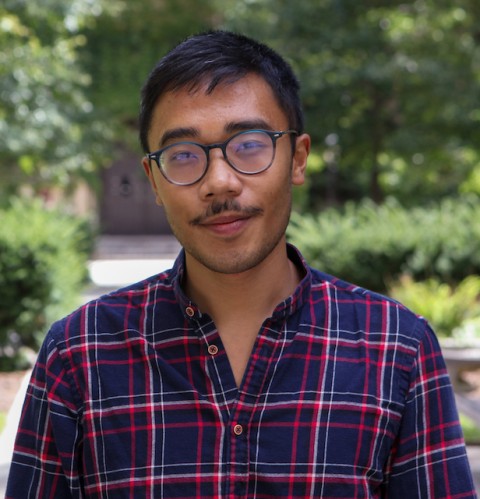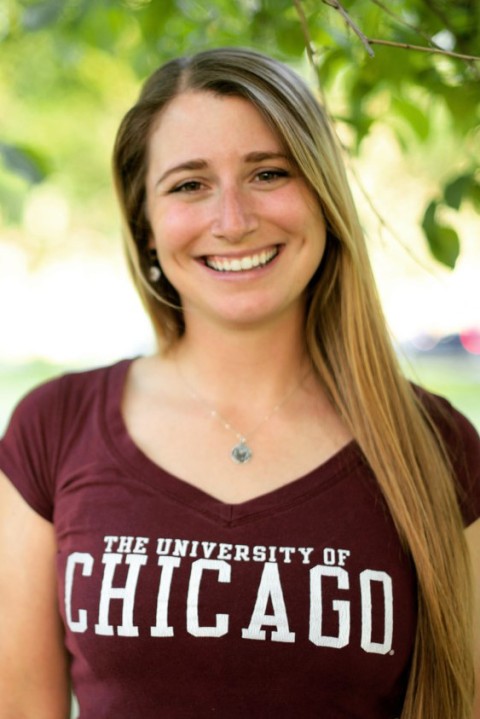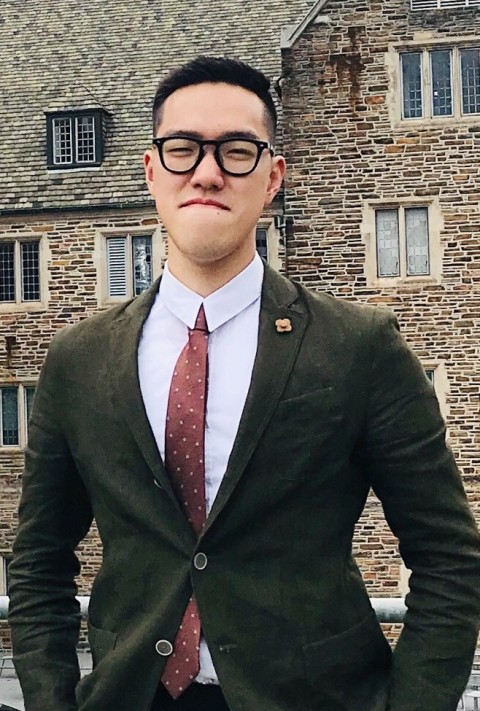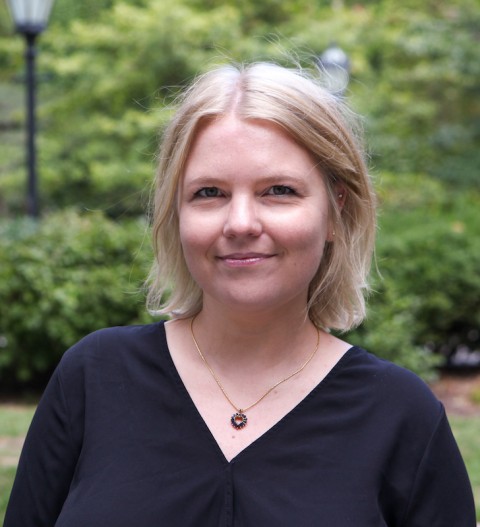Ian Bongalonta, Karlyn Gorski, Peishu Li and Marguerite Sandholm have been named the 2022 winners of the Wayne C. Booth Prize for Excellence in Teaching, awarded annually to University of Chicago graduate students for outstanding instruction of undergraduates.
Prize recipients were selected on the basis of nominations from students in the College. The prize itself was established in 1991 in honor of Booth, PhD’50, the late UChicago faculty member who was one of the 20th century’s most influential literary critics.
In addition to the Booth Prize, five faculty members were recently awarded the Llewellyn John and Harriet Manchester Quantrell Awards and four instructors received the Glenn and Claire Swogger Award.
Learn more about this year’s Booth Prize recipients below:
Ian Bongalonta, Theoretical Chemistry Ph.D. Student, Department of Chemistry

Ian Bongalonta first became interested in theoretical chemistry as an undergraduate student while working in electronic structure theory.
Later on, performing chemical simulations and learning about the mathematics and physics behind predicting chemical phenomena inspired him to pursue a career in academia. He is now a teaching assistant for the Honors General Chemistry course sequence for first-years in the College.
“Just like the molecules we discuss in thermodynamics, the ‘energy exchange’ between me and my students is definitely the most fulfilling part of the course,” he said. “While guiding everyone through difficult concepts, we have fun, productive conversations which help everyone grow as both students and scientists.”
Currently working with advisor Professor Gregory Voth in his P.h.D. studies, he is broadly interested in quantum dynamics and statistical mechanics and their applications to biophysical systems.
Bongalonta emphasizes to his students that STEM fields are just as much an art as they are a science.
“While mastering a tricky integration technique might be necessary for learning kinetics, the skill of thinking outside of the box or synthesizing your own methods are indispensable for making new knowledge,” he said. “Your creativity is as important as your math. Perfect practice makes perfect!”
Beyond his enjoyment of teaching chemistry material, Bongalonta said it has been gratifying to talk with his students about undergraduate research and watch them join research groups. In a nomination letter for the Booth Prize, one former student wrote that Ian was always helpful in and out of office hours, despite having an intense course load himself.
“He tries actively to make the class enjoyable by relating with his students, and generally bringing humor to lab and discussion while explaining topics clearly,” the letter said. “Overall, Ian creates a thoroughly enjoyable learning environment despite the difficulty of the class.”
Karlyn Gorski, Institute of Education Sciences Pre-Doctoral Fellow, Department of Sociology

Karlyn Gorski’s interest in education and research goes back to her time as an undergraduate student in the College, where she studied Public Policy. She credits Chad Broughton’s instruction on ethnographic research in particular with shaping her future work.
“I was so lucky to have Chad Broughton as an instructor in the College because he always encouraged me to get to know people and listen closely to their stories,” Gorski said. “Sometimes this meant letting my research go in unexpected directions, or pursuing leads that may or may not work out.”
Following the completion of her undergraduate degree, Gorski spent time working with Chicago Public Schools, teaching in India, and finally coming back to the University of Chicago for a Ph.D. program in Sociology. Upon her return, she began teaching classes on education and research methods.
She is currently teaching “Race, Ethnicity, and American Public Schools,” a course she designed for the Critical Race and Ethnic Studies major. In the fall, she will be starting as an Assistant Instructional Professor at the Harris School of Public Policy.
Gorski values student-directed learning as a major component of her courses, including independent research projects and small group discussions. She also enjoys working with Public Policy students for their thesis research presentations at the BA Symposium.
She works diligently to foster students’ passions and love of learning in all of her instruction, encouraging students to follow their interests wherever they lead.
“I always try to leave students with the message that their interests and passions are valuable, even if they worry others might see them as niche or too rooted in personal experience,” she said. “My research has all grown out of things I find joyful — like kids selling chips in school, or students finding a feeling of belonging through extracurricular activities. It’s been a delight to get to watch my students pursue their own interests.”
Peishu Li, Teaching Assistant and P.h.D Candidate, Biological Sciences Collegiate Division

Fascinated by the diversity of life as documented by the fossil record, Peishu Li sought a career in vertebrate paleobiology and evolution. Since graduating from Duke University with a double-major in Earth sciences and biology, he continues to take an interdisciplinary approach to learning.
Currently at UChicago, Li is writing his thesis on the evolution of the hyoid apparatus in mammals, with a focus on how anatomical variation in this system may impact swallowing physiology in different groups.
Along with researching, Li has served as a teaching assistant for two classes. “Mammalian Evolutionary Biology” presents a broad survey into the diversity of living mammals and their extinct relatives, while “Biological Evolution” covers a wide range of topics in evolutionary biology, from the origin of life to speciation and mass extinction.
Li believes it is important to leave room for students to make their own mistakes. This became even more apparent during the cat dissection in “Mammalian Evolutionary Biology.” Spending extra time outside the class to help struggling students, Li ensured everyone came away with a strong understanding of the necessary anatomy.
“I tried to emphasize that the real takeaway is not for them to finish with a perfectly dissected cat, but rather use the process of dissection as a vehicle to familiarize themselves with general principles of anatomy and muscle physiology,” he said. “I hope being comfortable in making mistakes and having the confidence to learn from them is something I can leave the students with even when they have long forgotten all other factual information from the class.”
To Li, working with undergraduate students has been a rewarding experience for both parties.
“Their intellectual curiosity and ability to rise to the learning challenge are inspiring to watch, and both classes I have taught so far have offered a tremendous amount of freedom for different students to explore their interests and share them with their peers and the instructors. At times it feels like we are on a learning journey together rather than us passively feeding information to the students.”
Marguerite Sandholm, P.h.D. student in the Department of Philosophy

Marguerite Sandholm was originally pursuing a degree in neuroscience as an undergraduate student, when the philosophy classes she was taking completely changed her outlook.
She came to realize that the broad questions which initially drew her to neuroscience, such as the nature of consciousness and the mind’s influence on human action and behavior, were not only limited to the physical sciences, but could also be approached philosophically.
From there, she became particularly concerned the philosophy of mind, particularly self-knowledge, self-reference and the nature of the self. These subjects, along with epistemology and ethics, are now her primary areas of academic interest.
“I had teachers who appreciated me just the way that I was, as a reserved, quiet student, and actively encouraged me to continue in philosophy,” she said. “I try to carry that same inclusive spirit into my classroom and make it a space where we appreciate differences, assume the best of each other, and recognize everyone’s contributions as valuable.”
Over the last year, along with her P.h.D. studies, Sandholm has worked as a course assistant for epistemology and ethics classes taught by Professor Ben Callard, and is currently a course assistant or Self-Creation as a Literary and Philosophical Problem, taught by Professor Agnes Callard.
In the classes Sandholm helps teach, she aims to form an intellectual community, and make the classroom a place where students are free to learn, sharpen each other’s arguments, make mistakes and be themselves.
“We like to incorporate joy and humor to our discussions while maintaining intellectual depth and rigor,” she said. “We assume the best of each other and encourage and appreciate everyone’s valuable contributions to discussion. Over the course, we become better philosophers together and we have fun doing it.”